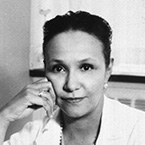
Jane Cooke Wright, MD, a pioneer in clinical cancer chemotherapy and AACR member for 59 years, died on Feb. 19, 2013, at the age of 93. The AACR Minorities in Cancer Research Jane Cooke Wright Lectureship was established in her honor in 2006 to recognize an outstanding scientist who has made meritorious contributions to the field of cancer research and who has, through leadership or by example, furthered the advancement of minority investigators in cancer research. Wright became the highest ranking black woman at a nationally recognized medical institution in 1967. During this time, there were only a few hundred black, female physicians in the United States.
The Jane Cooke Wright lectureship is presented each year at the AACR Annual Meeting, and Wright has attended the meeting every year since it was established in her honor in order to provide opening remarks and introduce the year’s lecturer. She had been an AACR member since 1954.
Born on Nov. 30, 1919, Wright grew up in Harlem in New York, N.Y. Her father, Louis Wright, one of the first black graduates of Harvard University Medical School, established the Cancer Research Center at Harlem Hospital. Wright would eventually do some of her most important research at the center. She began to study art at Smith College in Northampton, Massachusetts, before changing her major to pre-med. She received a full academic scholarship from New York Medical College, where she was one of few black students. There, Wright was elected vice president of her class and president of the Honor Society; she graduated with honors in 1945.
Wright eventually joined her father at the Cancer Research Foundation at Harlem Hospital, where they began experimenting together with chemical agents on leukemia in mice. They eventually began treating patients with anticancer drugs and saw them experience some form of remission. Wright continued her research in anticancer agents throughout her career by exploring the relationship between patient and tissue culture response and developing new techniques for chemotherapy administration.
Wright became director of the Cancer Research Center following her father’s death in 1952. In 1955, she became an associate professor of surgical research at New York University Medical Center and was appointed to the President ‘s Commission on Heart Disease, Cancer and Stroke by President Lyndon B. Johnson in 1964. The commission ‘s report led to the establishment of a national network of treatment centers for the three diseases. Wright became the highest ranking black woman at an American medical institution when she was named professor of surgery, head of the cancer chemotherapy department and associate dean at New York Medical College in 1967. She became the first woman elected president of the New York Cancer Society.
Wright, a founding member of the American Society of Clinical Oncology, served on the board of directors of the American Cancer Society, New York. She published more than 100 papers throughout her career and led delegations of cancer researchers to Africa, Asia and Eastern Europe. Wright was preceded in death by her husband, David Dallas Jones Jr., and is survived by her daughters, Alison Jones, PhD, and Jane Jones, MD, and a sister, Barbara Wright Pierce.
Career Highlights
1981 Otelia Cromwell Award, Smith College
1975 AACR Award
1971 Elected President, New York Cancer Society
1970-1980 Board of Trustees, Smith College
1968 Smith Medal, Smith College
1967-75 Associate Dean, New York Medical College
1967 Hadassah Myrtle Wreath Award
1966-1970 National Cancer Advisory Board
1965 Spirit of Achievement Award, Albert Einstein College of Medicine
1964-1967 Secretary/Treasurer, ASCO
1964-1965 Member, Presidential Commission on Heart Disease, Cancer, and Stroke
1953 Damon Runyon Award
1952-1955 Director, Harlem Hospital Cancer Research Foundation
1952 Merit Award, Mademoiselle Magazine
1945 MD, New York Medical College